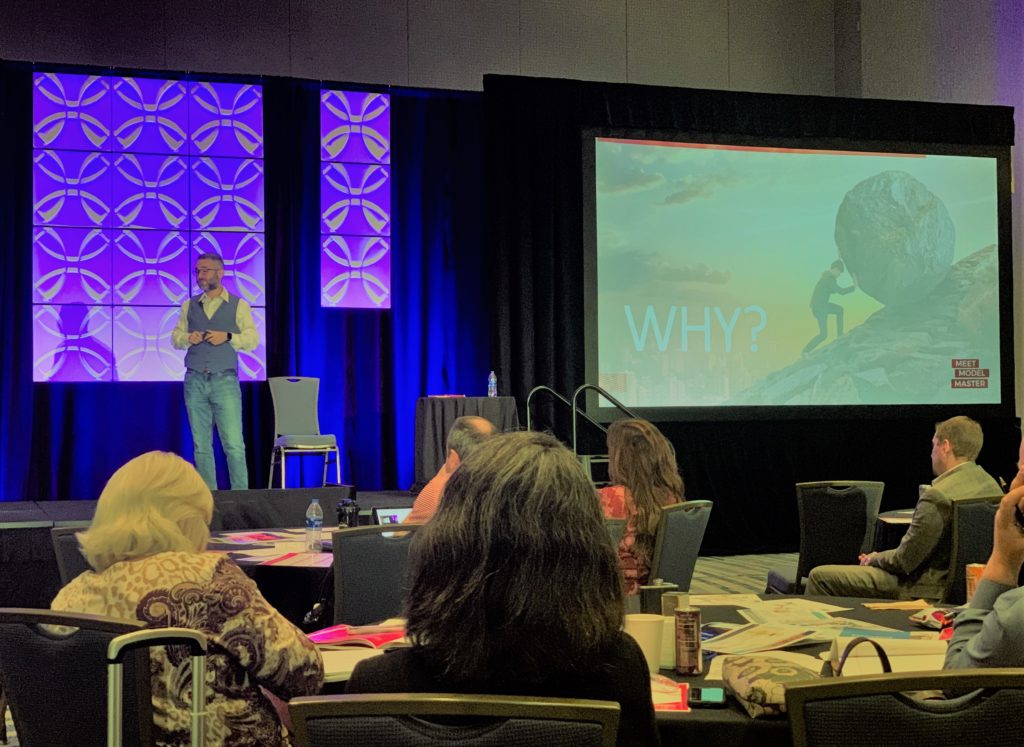Interview: David Contorno
David Contorno slays another keynote address, but this time it was personal.
When he was asked to present at Nelson Griswold’s Master the C-Suite event in Denver, CO last week. it was also requested that he highlight not just his successes as a disruptive consultant, but his failures and struggles as well.
Many know David to be a controversial and outspoken industry advocate who fights relentlessly against the systems perverse incentives. With his loud and untamed approach often comes a misconception of who he really is. We caught up with David after his C-Suite address to codify exactly what inspires him to take a protective stance for his clients and industry colleagues.

THE INTERVIEW
You recently presented at the Master The C-Suite event in Denver and during your closing keynote you spoke intimately about your ‘why’. Can you reiterate what you explained from the stage for our virtual readers?
My why comes from empathy and sympathy. All of the people making healthcare decisions (policy and financing) sit in an ivory tower of the top 7% of income earners (myself included). The employers, the brokers, the hospital administrators, the carrier execs. All of them can easily afford to fund, and benefit from the tax breaks of a high deductible health plan. But what does that same decision mean for the average American? It means pain and fear. The premiums alone are unaffordable, but when you add in that the average out-of-pocket cost in the US is cresting above $5,000 while the average American has under $1000 in savings, where do those decisions leave them? It leaves them scared to manage their disease, scared to use the “benefits” both they and their employer pay for, and overall is contributing to the declining health and declining life expectancy here in the good ole US of A.
Your platform in the industry can seem very contentious at times – why do you think people are still opposed to changing the wave, and how do you deal with the criticism personally?
I think all humans are adverse to change. But I think its even stronger in healthcare. First off, people are highly uneducated on how the system works. Even those within the system often only see it from their own vantage point. In Dr. Marty Makary’s new book, as a doctor for many years, he had never even heard of broker, yet that is the primary source employers use for making decisions on how to pay that very same doctor (and half of all healthcare in the US). Our model demands transparency. In a system that has none, and one in which the main players have found a way to capitalize on the dysfunctional system, the interests in not changing are very strong. And they use scare tactics at all levels. Brokers are threatened to have their carrier contracts cut and threaten their very business and livelihood. Employers think carriers are aligned with them as a result of clever marketing but then spend excess dollars on healthcare that would otherwise go to wages or employee comforts and culture. Then add in the sheer magnitude of dollars we are talking and that adds in more fear. Lastly, and perhaps most compellingly, people think healthcare and health insurance are one in the same so they’re scared that if they make a change to their insurance, they might get sub-par healthcare or no access to healthcare at all. But I argue that is exactly what they are getting today in the face of rising costs that have made it completely unafforable to actually receive care. We have to change this and if I have to take a little heat for being the one to bring this dysfunction to light, I’m happy to do so as long as it continues to help people.
During your talk yesterday you spoke a lot about your personal experience with addiction and your focus on honesty and doing the right thing since your recovery. How would you reiterate that message in print?
I am an alcoholic and I’ve been sober for 12 + years. As a sober alcoholic, I was taught that my drinking was but a symptom of the disease. The real disease was my behavior. The drinking allowed me a short respite from the consequences of my behavior. I had to hit my bottom. I had to get to a place where staying the same was more painful than the changes I needed to make. I had a choice; I could wait and hit the bottom which for many alcoholics means homelessness, jail, or even death. Or, I could bring the bottom up to meet me where I was at that point. Luckily, I had help to make the latter a reality. We are at that same point in healthcare. We can wait and it can collapse around us or be taken over by special interests and the government, or we can take control, get honest with ourselves, with our doctors, with our employees, with our clients, with ourselves…..and actually fix this. The tools are all out there. People just need to stop being afraid.
You’ve been leading E Powered Benefits for over a year now. What have you learned in the last year and how has it impacted how you do business today, in this new model?
I’ve learned that even a bad system is made up of a lot of good people. While I felt I needed to take a path of pushing people… maybe even accusing them, I now see that a little differently. Instead, I want to be a visible and vocal example of one effective way to lead positive change in our industry. I don’t purport it to be the “right” way, and its certainly not the only way, but our industry is rife with a legacy of false promises. I am determined to not be one of them.

